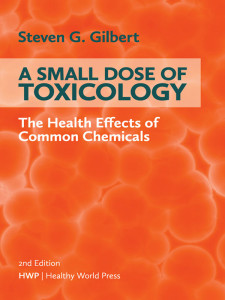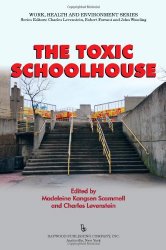Toxics
Toxic Solvents and Vapors
 My guest today is toxicologist Steven G. Gilbert, PhD, DABT, He’s a regular guest who is helping us understand the toxicity of common chemicals we may be frequently exposed to. Today we’re going to talking about solvents and vaports. This large class of chemicals includes all the chemicals known as “VOCs” which enter our bodies through breathing or absorbtion through the skin. We’ll explore how you are exposed to solvents and vapors and their health effects. Dr. Gilbert is Director and Founder of
My guest today is toxicologist Steven G. Gilbert, PhD, DABT, He’s a regular guest who is helping us understand the toxicity of common chemicals we may be frequently exposed to. Today we’re going to talking about solvents and vaports. This large class of chemicals includes all the chemicals known as “VOCs” which enter our bodies through breathing or absorbtion through the skin. We’ll explore how you are exposed to solvents and vapors and their health effects. Dr. Gilbert is Director and Founder of  the Institute of Neurotoxicology and author of A Small Dose of Toxicology- The Health Effects of Common Chemicals. He received his Ph.D. in Toxicology in 1986 from the University of Rochester, Rochester, NY, is a Diplomat of American Board of Toxicology, and an Affiliate Professor in the Department of Environmental and Occupational Health Sciences, University of Washington. His research has focused on neurobehavioral effects of low-level exposure to lead and mercury on the developing nervous system. Dr. Gilbert has an extensive website about toxicology called Toxipedia, which includes a suite of sites that put scientific information in the context of history, society, and culture. www.toxipedia.org
the Institute of Neurotoxicology and author of A Small Dose of Toxicology- The Health Effects of Common Chemicals. He received his Ph.D. in Toxicology in 1986 from the University of Rochester, Rochester, NY, is a Diplomat of American Board of Toxicology, and an Affiliate Professor in the Department of Environmental and Occupational Health Sciences, University of Washington. His research has focused on neurobehavioral effects of low-level exposure to lead and mercury on the developing nervous system. Dr. Gilbert has an extensive website about toxicology called Toxipedia, which includes a suite of sites that put scientific information in the context of history, society, and culture. www.toxipedia.org
Are Toxic Dangers Internet Hype or a Genuine Health Crisis?
 My guest today is Lara Adler, Environmental Toxins Expert and Certified Holistic Health Coach. Today we’ll be talking about the popularity of toxics in the news and online, the difference between sensationalism and truth, and facts vs editorial opinions from writers who don’t understand the subject. Lara trains and educates practitioners within the health and wellness community to better understand the links between environmental toxins and their impact on disease states—from weight gain and diabetes, to thyroid disease and developmental disorders—so they can better support their clients. Lara is deeply committed to peeling back the curtain and opening up the conversation about environmental toxins to people in a way that’s informative, accessible, actionable and totally free from overwhelm. She takes a practical, real-world approach to minimizing toxic exposure to safeguard our health. www.laraadler.com
My guest today is Lara Adler, Environmental Toxins Expert and Certified Holistic Health Coach. Today we’ll be talking about the popularity of toxics in the news and online, the difference between sensationalism and truth, and facts vs editorial opinions from writers who don’t understand the subject. Lara trains and educates practitioners within the health and wellness community to better understand the links between environmental toxins and their impact on disease states—from weight gain and diabetes, to thyroid disease and developmental disorders—so they can better support their clients. Lara is deeply committed to peeling back the curtain and opening up the conversation about environmental toxins to people in a way that’s informative, accessible, actionable and totally free from overwhelm. She takes a practical, real-world approach to minimizing toxic exposure to safeguard our health. www.laraadler.com
Tales From Toxic Homes—A Household Toxicologist Shares His Experience
 Today my guest is David Abbot, author of Healing Your Family With Practical Household Toxicology. We’ll be talking about his first-hand experience identifying toxic chemicals in homes, his observations of how these toxics affected the health of the home’s inhabitants, and ways everyone can reduce toxic exposures at home. David became aware he was sensitive to chemicals in the early 1980’s, but in retrospect he realized he had been chemically sensitive since he was a child. Like everyone born in the 1950’s, he had been exposed to DDT and many other highly toxic chemicals. A retired general contractor, David got formal training in a household toxicology program in the early 1980’s. The teachers included a PhD in toxicology, a mycologist for a public health department, a medical doctor who was board certified in environmental medicine and had a masters in public health, a chemist, an engineer, and various EPA experts. He also recieved informal training from a microbiologist, a few chemists, a nuclear inspector at the Bremerton Naval Shipyard, and an electrical engineer. He studied household and industrial vacuum and air cleaning technology at the engineering library, as well as buying many vacuum cleaners and air cleaners and using them and taking them apart, so he could understand how they worked and how many of them are improperly designed, do not really work right, and expose people to toxins and allergens. He then volunteered for about three years, going to the houses of people whose health conditions did not respond to medical treatment. In every case he found chemical toxins and/or biological allergens that are known to cause those medical conditions. You may email David at David healthy.environment@frontier.com for information on how to order his book.
Today my guest is David Abbot, author of Healing Your Family With Practical Household Toxicology. We’ll be talking about his first-hand experience identifying toxic chemicals in homes, his observations of how these toxics affected the health of the home’s inhabitants, and ways everyone can reduce toxic exposures at home. David became aware he was sensitive to chemicals in the early 1980’s, but in retrospect he realized he had been chemically sensitive since he was a child. Like everyone born in the 1950’s, he had been exposed to DDT and many other highly toxic chemicals. A retired general contractor, David got formal training in a household toxicology program in the early 1980’s. The teachers included a PhD in toxicology, a mycologist for a public health department, a medical doctor who was board certified in environmental medicine and had a masters in public health, a chemist, an engineer, and various EPA experts. He also recieved informal training from a microbiologist, a few chemists, a nuclear inspector at the Bremerton Naval Shipyard, and an electrical engineer. He studied household and industrial vacuum and air cleaning technology at the engineering library, as well as buying many vacuum cleaners and air cleaners and using them and taking them apart, so he could understand how they worked and how many of them are improperly designed, do not really work right, and expose people to toxins and allergens. He then volunteered for about three years, going to the houses of people whose health conditions did not respond to medical treatment. In every case he found chemical toxins and/or biological allergens that are known to cause those medical conditions. You may email David at David healthy.environment@frontier.com for information on how to order his book.
How Toxic Chemicals Affect Your Brain and What You Can Do to Reduce Exposure
 Today my guest is Angel De Fazio, BSAT, President, Executive Director, and co-founder of the National Toxic Encephalopathy Foundation (NTEF). We’ll be talking about toxics that affect your brain, toxics activism, and what it’s like to have your brain affected by toxic chemicals. Angel, the NTEF, and other activists completed an onerous and highly contentious, two-year awareness campaign in 2013 supporting the right for Nevada’s energy ratepayers to opt out of the smart meter deployment. The campaign started in 2011. May is Toxic Encephalopathy and Chemical Injury Awareness Month. For over a decade, the NTEF has conducted outreach throughout the month including numerous proclamations from Nevada Governors, Las Vegas City Council, Clark County Commissioners, and the City of Henderson. In 2010, Las Vegas City Council participated by going fragrance and chemical free in support of creating awareness. Last year, in 2014, the NTEF was solely responsible for one of the Nevada State Offices going fragrance free. The NTEF is a non-profit organization whose core purposes are to provide education and services to the growing segment of the population who are adversely affected by everyday chemicals and toxins in our environment. NTEF-USA.Org | ChemicalFreeLiving.Com
Today my guest is Angel De Fazio, BSAT, President, Executive Director, and co-founder of the National Toxic Encephalopathy Foundation (NTEF). We’ll be talking about toxics that affect your brain, toxics activism, and what it’s like to have your brain affected by toxic chemicals. Angel, the NTEF, and other activists completed an onerous and highly contentious, two-year awareness campaign in 2013 supporting the right for Nevada’s energy ratepayers to opt out of the smart meter deployment. The campaign started in 2011. May is Toxic Encephalopathy and Chemical Injury Awareness Month. For over a decade, the NTEF has conducted outreach throughout the month including numerous proclamations from Nevada Governors, Las Vegas City Council, Clark County Commissioners, and the City of Henderson. In 2010, Las Vegas City Council participated by going fragrance and chemical free in support of creating awareness. Last year, in 2014, the NTEF was solely responsible for one of the Nevada State Offices going fragrance free. The NTEF is a non-profit organization whose core purposes are to provide education and services to the growing segment of the population who are adversely affected by everyday chemicals and toxins in our environment. NTEF-USA.Org | ChemicalFreeLiving.Com
How Pesticides Can Harm Your Health
 My guest today is toxicologist Steven G. Gilbert, PhD, DABT, He’s a regular guest who is helping us understand the toxicity of common chemicals we may be frequently exposed to. Today we’re going to talking about pesticides, which is a large class of chemicals with many different degrees of danger. Dr. Gilbert is Director and Founder of the Institute of Neurotoxicology and author of A Small Dose of
My guest today is toxicologist Steven G. Gilbert, PhD, DABT, He’s a regular guest who is helping us understand the toxicity of common chemicals we may be frequently exposed to. Today we’re going to talking about pesticides, which is a large class of chemicals with many different degrees of danger. Dr. Gilbert is Director and Founder of the Institute of Neurotoxicology and author of A Small Dose of  Toxicology- The Health Effects of Common Chemicals.He received his Ph.D. in Toxicology in 1986 from the University of Rochester, Rochester, NY, is a Diplomat of American Board of Toxicology, and an Affiliate Professor in the Department of Environmental and Occupational Health Sciences, University of Washington. His research has focused on neurobehavioral effects of low-level exposure to lead and mercury on the developing nervous system. Dr. Gilbert has an extensive website about toxicology called Toxipedia, which includes a suite of sites that put scientific information in the context of history, society, and culture. www.toxipedia.org
Toxicology- The Health Effects of Common Chemicals.He received his Ph.D. in Toxicology in 1986 from the University of Rochester, Rochester, NY, is a Diplomat of American Board of Toxicology, and an Affiliate Professor in the Department of Environmental and Occupational Health Sciences, University of Washington. His research has focused on neurobehavioral effects of low-level exposure to lead and mercury on the developing nervous system. Dr. Gilbert has an extensive website about toxicology called Toxipedia, which includes a suite of sites that put scientific information in the context of history, society, and culture. www.toxipedia.org
Toxics in Schools
 My guest today is Charles Levenstein, Ph.D., MSc , an economist, policy analyst and co-author of The Toxic Schoolhouse. We’ll be talking about chemical hazards endangering students, teachers, and staff in the education system of the United States and Canada. Dr Levenstein is Professor Emeritus in Department of Work Environment, retiring from teaching in 2003. He is adjunct professor of occupational health at Tufts University School of Medicine and one of the leading researchers concerned with social factors in occupational and environmental health. For several years he was co-director of the Organized Labor and Tobacco Control Consortium, funded by the American Legacy Foundation at Dana Farber Cancer Institute.
My guest today is Charles Levenstein, Ph.D., MSc , an economist, policy analyst and co-author of The Toxic Schoolhouse. We’ll be talking about chemical hazards endangering students, teachers, and staff in the education system of the United States and Canada. Dr Levenstein is Professor Emeritus in Department of Work Environment, retiring from teaching in 2003. He is adjunct professor of occupational health at Tufts University School of Medicine and one of the leading researchers concerned with social factors in occupational and environmental health. For several years he was co-director of the Organized Labor and Tobacco Control Consortium, funded by the American Legacy Foundation at Dana Farber Cancer Institute.  He subsequently became a consultant to Dr. Edith Balbach’s NCI-funded research on tobacco industry relations with trade unions. He has served as member and chair of the environmental health and safety committee of the Massachusetts Teachers Association. He has been engaged in intervention research in immigrant communities and in the economic evaluation of occupational health and safety interventions. Until recently, Dr Levenstein chaired the advisory committee for United Steel Workers Federally-funded health and safety projects; he continues to chair the advisory board of The New England Consortium, an NIEHS-funded collaboration of health and safety advocacy groups, trade unions and academics. He is Editor Emeritus of New Solutions, a quarterly peer-reviewed journal of occupational and environmental health policy and is co-editor of the Baywood series on Work, Health and Environment. Dr. Levenstein is a recipient of the American Public Health Association’s award for lifetime contribution to occupational health.
He subsequently became a consultant to Dr. Edith Balbach’s NCI-funded research on tobacco industry relations with trade unions. He has served as member and chair of the environmental health and safety committee of the Massachusetts Teachers Association. He has been engaged in intervention research in immigrant communities and in the economic evaluation of occupational health and safety interventions. Until recently, Dr Levenstein chaired the advisory committee for United Steel Workers Federally-funded health and safety projects; he continues to chair the advisory board of The New England Consortium, an NIEHS-funded collaboration of health and safety advocacy groups, trade unions and academics. He is Editor Emeritus of New Solutions, a quarterly peer-reviewed journal of occupational and environmental health policy and is co-editor of the Baywood series on Work, Health and Environment. Dr. Levenstein is a recipient of the American Public Health Association’s award for lifetime contribution to occupational health.
Surprising Hidden Toxics in Consumer Products
 My guest today is Professor Anne Steinemann, who has for many years been a champion for those sensitive to toxic chemicals in consumer products. She tests everyday consumer products to find out what toxic chemicals are actually present in them, many of which are not listed on labels or MSDS sheets. In this recorded interview from Australia, we talk about toxics she found in both standard and natural/organic products, our rights to toxic free public places, and our power as consumers to change the marketplace. Anne Steinemann is Professor of Civil Engineering and Chair of Sustainable Cities at the University of Melbourne, Australia. She is an internationally recognized expert in areas of engineering and sustainability including environmental pollutants, infrastructure systems, and health. Her recent research addresses indoor air quality, exposure assessment, consumer product analyses, drought planning and forecasting, hazard mitigation, and healthy buildings and communities. She serves as adviser to governments and industries around the world and has directed major federally funded research programs. Her work has resulted in new federal and state legislation, agency policies and industry practices. Professor Steinemann has received the highest teaching awards at the college, university and national levels. She has published over 50 journal articles and two textbooks. Professor Steinemann’s research and journal articles have received significant international media coverage spanning more than 1,000 major newspapers, magazines and broadcast stations across six continents. Dr. Steinemann received her Ph.D. in Civil and Environmental Engineering from Stanford University. www.drsteinemann.com | www.drsteinemann.com/publications.html
My guest today is Professor Anne Steinemann, who has for many years been a champion for those sensitive to toxic chemicals in consumer products. She tests everyday consumer products to find out what toxic chemicals are actually present in them, many of which are not listed on labels or MSDS sheets. In this recorded interview from Australia, we talk about toxics she found in both standard and natural/organic products, our rights to toxic free public places, and our power as consumers to change the marketplace. Anne Steinemann is Professor of Civil Engineering and Chair of Sustainable Cities at the University of Melbourne, Australia. She is an internationally recognized expert in areas of engineering and sustainability including environmental pollutants, infrastructure systems, and health. Her recent research addresses indoor air quality, exposure assessment, consumer product analyses, drought planning and forecasting, hazard mitigation, and healthy buildings and communities. She serves as adviser to governments and industries around the world and has directed major federally funded research programs. Her work has resulted in new federal and state legislation, agency policies and industry practices. Professor Steinemann has received the highest teaching awards at the college, university and national levels. She has published over 50 journal articles and two textbooks. Professor Steinemann’s research and journal articles have received significant international media coverage spanning more than 1,000 major newspapers, magazines and broadcast stations across six continents. Dr. Steinemann received her Ph.D. in Civil and Environmental Engineering from Stanford University. www.drsteinemann.com | www.drsteinemann.com/publications.html
Why Do People Doubt the Science Behind Toxics?
 My guest today is toxicologist Steven G. Gilbert, PhD, DABT, He’s a regular guest who is helping us understand the toxicity of common chemicals we may be frequently exposed to. Today we’re going to take a look at a related subject: why people don’t believe there is a problem with toxics when there is so much scientific evidence. And how can we get this vital information more widely known? Dr. Gilbert is Director and Founder of the Institute of Neurotoxicology and author of A Small Dose of
My guest today is toxicologist Steven G. Gilbert, PhD, DABT, He’s a regular guest who is helping us understand the toxicity of common chemicals we may be frequently exposed to. Today we’re going to take a look at a related subject: why people don’t believe there is a problem with toxics when there is so much scientific evidence. And how can we get this vital information more widely known? Dr. Gilbert is Director and Founder of the Institute of Neurotoxicology and author of A Small Dose of  Toxicology- The Health Effects of Common Chemicals.He received his Ph.D. in Toxicology in 1986 from the University of Rochester, Rochester, NY, is a Diplomat of American Board of Toxicology, and an Affiliate Professor in the Department of Environmental and Occupational Health Sciences, University of Washington. His research has focused on neurobehavioral effects of low-level exposure to lead and mercury on the developing nervous system. Dr. Gilbert has an extensive website about toxicology called Toxipedia, which includes a suite of sites that put scientific information in the context of history, society, and culture. www.toxipedia.org
Toxicology- The Health Effects of Common Chemicals.He received his Ph.D. in Toxicology in 1986 from the University of Rochester, Rochester, NY, is a Diplomat of American Board of Toxicology, and an Affiliate Professor in the Department of Environmental and Occupational Health Sciences, University of Washington. His research has focused on neurobehavioral effects of low-level exposure to lead and mercury on the developing nervous system. Dr. Gilbert has an extensive website about toxicology called Toxipedia, which includes a suite of sites that put scientific information in the context of history, society, and culture. www.toxipedia.org
Toxic Chemicals and Autistic Children
 Today my guest is Kim Spencer, Co-Founder and Vice President of Public Relations at The Thinking Moms’ Revolution. We’ll be talking about how mercury in vaccines and other toxic chemicals can contribute to autism and what she did to reverse his autism. Kim is a graduate of The University of Georgia and worked in Television, Telecommunications and Public Relations before her first child was diagnosed with autism at the age of 2 1/2. After researching his condition, she discovered his autism symptoms stemmed from autoimmune issues exacerbated by his childhood vaccines. Through treatment for vaccine injury, mercury toxicity and PANDAS, his condition has dramatically improved and he is fully included in 8th grade. Since his diagnosis, Kim has been an advocate and activist in the autism community. She has spoken at the CDC, appeared in many media stories, worked as a patient coordinator and autism advocate at her son’s pediatrician’s office. The Thinking Moms’ Revolution began when a group of twenty-three moms (and one awesome dad) from around the world got together online to figure out how to help their children with developmental disabilities. Suspecting that some of the main causes might be overused medicines, vaccinations, environmental toxins, and processed foods, they began a mission to help reverse the effects. And now they are a thriving organization offering much-needed information to parents. http://thinkingmomsrevolution.com
Today my guest is Kim Spencer, Co-Founder and Vice President of Public Relations at The Thinking Moms’ Revolution. We’ll be talking about how mercury in vaccines and other toxic chemicals can contribute to autism and what she did to reverse his autism. Kim is a graduate of The University of Georgia and worked in Television, Telecommunications and Public Relations before her first child was diagnosed with autism at the age of 2 1/2. After researching his condition, she discovered his autism symptoms stemmed from autoimmune issues exacerbated by his childhood vaccines. Through treatment for vaccine injury, mercury toxicity and PANDAS, his condition has dramatically improved and he is fully included in 8th grade. Since his diagnosis, Kim has been an advocate and activist in the autism community. She has spoken at the CDC, appeared in many media stories, worked as a patient coordinator and autism advocate at her son’s pediatrician’s office. The Thinking Moms’ Revolution began when a group of twenty-three moms (and one awesome dad) from around the world got together online to figure out how to help their children with developmental disabilities. Suspecting that some of the main causes might be overused medicines, vaccinations, environmental toxins, and processed foods, they began a mission to help reverse the effects. And now they are a thriving organization offering much-needed information to parents. http://thinkingmomsrevolution.com
There is No Safe Level for Lead Exposure
 Toxicologist Steven G. Gilbert, PhD, DABT, a regular guest who is helping us understand the toxicity of common chemicals we may be frequently exposed to. Dr. Gilbert is Director and Founder of the Institute of Neurotoxicology and author of A Small Dose of Toxicology- The Health Effects of Common Chemicals.
Toxicologist Steven G. Gilbert, PhD, DABT, a regular guest who is helping us understand the toxicity of common chemicals we may be frequently exposed to. Dr. Gilbert is Director and Founder of the Institute of Neurotoxicology and author of A Small Dose of Toxicology- The Health Effects of Common Chemicals.  He received his Ph.D. in Toxicology in 1986 from the University of Rochester, Rochester, NY, is a Diplomat of American Board of Toxicology, and an Affiliate Professor in the Department of Environmental and Occupational Health Sciences, University of Washington. His research has focused on neurobehavioral effects of low-level exposure to lead and mercury on the developing nervous system. Dr. Gilbert has an extensive website about toxicology called Toxipedia, which includes a suite of sites that put scientific information in the context of history, society, and culture. www.toxipedia.org
He received his Ph.D. in Toxicology in 1986 from the University of Rochester, Rochester, NY, is a Diplomat of American Board of Toxicology, and an Affiliate Professor in the Department of Environmental and Occupational Health Sciences, University of Washington. His research has focused on neurobehavioral effects of low-level exposure to lead and mercury on the developing nervous system. Dr. Gilbert has an extensive website about toxicology called Toxipedia, which includes a suite of sites that put scientific information in the context of history, society, and culture. www.toxipedia.org


